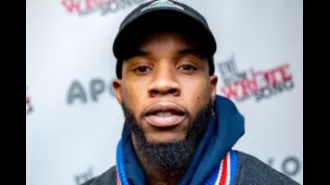A bottle of shampoo revealed my true loneliness.
I hoped for a surprise in the bagging area to lighten the mood.
October 21st 2024.

Loneliness and depression can be a powerful duo, as Sionna can attest. It was a realization that hit me hard as I stood in the grocery store, realizing that it had been two whole weeks since I last had a face-to-face conversation with someone. The thought struck me as I was browsing the shampoo aisle, realizing that I had gone through an entire bottle since I last saw a friend. And let me tell you, it takes me a solid two weeks to use up a bottle of shampoo. I couldn't help but feel completely alone in that moment.
I remember writing in my journal about it, back in April of 2024. "My only interaction today was with a self-service checkout," I wrote. "I was secretly hoping for an unexpected item in the bagging area, just for some human contact." It was a sad realization, but one that I couldn't deny. "So yes, it's fair to say I'm lonely," I concluded. But then again, it's not that surprising when you consider that I'm part of the "loneliest generation".
As someone born in the late 1990s, I grew up in a globalized world where technology and social media were the norm. And as I went through university and started my career, it seemed that everything was done over video calls and virtual meetings. It's no wonder that studies show that young adults between the ages of 16-29 are twice as likely to feel lonely often or always, flipping the traditional perception of loneliness being an "old person's problem" on its head.
But loneliness wasn't a new feeling for me. I had always felt like an outsider, a "misunderstood genius" in my teenage years. I buried myself in books and ignored social cues, leaving me with only a few friends and a constant feeling of being on the outside. I thought I had finally found my place when I went off to university and joined societies, went on dates, and had friends and boyfriends. But that feeling of not belonging never quite went away.
As the years went by, that feeling of isolation only grew stronger. And in the spring of 2024, when I found myself without a job, a partner, or any regular social group, it turned into a chronic state of loneliness. I tried reaching out to friends, texting them to make plans, but many were too busy or simply left my messages on read. It only added to my depression, and I can attest that loneliness and depression make for powerful allies.
But I can't solely blame global events for our "loneliness epidemic". There seems to be something inherent in the way my generation, Gen Z, treats each other that is driving our isolation. We have a habit of "quietly quitting friendships", ending them by putting in minimal effort. We prefer "low maintenance friendships" and are experts at ignoring each other, using self-care as an excuse for negligence.
Technology also plays a role in exacerbating the problem. We've become so accustomed to communicating through text that we've convinced ourselves it's okay to put people on pause, marked as unread, for days, weeks, or even months. But the truth is, people can't be put on pause. We don't stop existing just because it's inconvenient for someone else.
I have to admit, I've been guilty of using my dislike for phones and social media as an excuse to ignore messages for days on end. But this year, when I found myself in a state of loneliness, I realized the impact my actions may be having on my friends. And even though I still spend a lot of time alone, I've learned that the only way to reduce loneliness and improve our mental health is by making an effort to look after each other.
We need to move past the idea that we don't owe anyone anything and remember that life is about compassion, not obligation. It's important to check up on friends we haven't seen in a while, respond to texts, and make time for one another. Because in the end, the only way to reverse our generation's loneliness epidemic is if we all try harder to look after one another. So let's make an effort to stick to our plans and reach out to our friends, even when we're feeling overwhelmed. And remember, it's okay to take some time to be alone, but you don't have to be lonely.
I remember writing in my journal about it, back in April of 2024. "My only interaction today was with a self-service checkout," I wrote. "I was secretly hoping for an unexpected item in the bagging area, just for some human contact." It was a sad realization, but one that I couldn't deny. "So yes, it's fair to say I'm lonely," I concluded. But then again, it's not that surprising when you consider that I'm part of the "loneliest generation".
As someone born in the late 1990s, I grew up in a globalized world where technology and social media were the norm. And as I went through university and started my career, it seemed that everything was done over video calls and virtual meetings. It's no wonder that studies show that young adults between the ages of 16-29 are twice as likely to feel lonely often or always, flipping the traditional perception of loneliness being an "old person's problem" on its head.
But loneliness wasn't a new feeling for me. I had always felt like an outsider, a "misunderstood genius" in my teenage years. I buried myself in books and ignored social cues, leaving me with only a few friends and a constant feeling of being on the outside. I thought I had finally found my place when I went off to university and joined societies, went on dates, and had friends and boyfriends. But that feeling of not belonging never quite went away.
As the years went by, that feeling of isolation only grew stronger. And in the spring of 2024, when I found myself without a job, a partner, or any regular social group, it turned into a chronic state of loneliness. I tried reaching out to friends, texting them to make plans, but many were too busy or simply left my messages on read. It only added to my depression, and I can attest that loneliness and depression make for powerful allies.
But I can't solely blame global events for our "loneliness epidemic". There seems to be something inherent in the way my generation, Gen Z, treats each other that is driving our isolation. We have a habit of "quietly quitting friendships", ending them by putting in minimal effort. We prefer "low maintenance friendships" and are experts at ignoring each other, using self-care as an excuse for negligence.
Technology also plays a role in exacerbating the problem. We've become so accustomed to communicating through text that we've convinced ourselves it's okay to put people on pause, marked as unread, for days, weeks, or even months. But the truth is, people can't be put on pause. We don't stop existing just because it's inconvenient for someone else.
I have to admit, I've been guilty of using my dislike for phones and social media as an excuse to ignore messages for days on end. But this year, when I found myself in a state of loneliness, I realized the impact my actions may be having on my friends. And even though I still spend a lot of time alone, I've learned that the only way to reduce loneliness and improve our mental health is by making an effort to look after each other.
We need to move past the idea that we don't owe anyone anything and remember that life is about compassion, not obligation. It's important to check up on friends we haven't seen in a while, respond to texts, and make time for one another. Because in the end, the only way to reverse our generation's loneliness epidemic is if we all try harder to look after one another. So let's make an effort to stick to our plans and reach out to our friends, even when we're feeling overwhelmed. And remember, it's okay to take some time to be alone, but you don't have to be lonely.
[This article has been trending online recently and has been generated with AI. Your feed is customized.]
[Generative AI is experimental.]
0
0
Submit Comment





